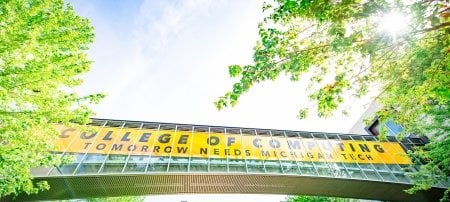As Michigan Tech's center of excellence in computing research, the Institute of Computing and Cybersystems (ICC) has set a primary objective to foster interdisciplinary collaborations that enable faculty to develop multidisciplinary proposals and conduct impactful research that otherwise would not be possible.
"When you have an interdisciplinary team, it enhances the outcomes of the research," says Tim Havens, William and Gloria Jackson Professor in Computer Science, who serves as executive director of both the ICC and the University's Great Lakes Research Center (GLRC). "When experts from all the relevant disciplines are involved and they're communicating with each other, everybody's learning something."
To advance interdisciplinary research, the ICC and GLRC co-established the Rapid Seedling Awards grant program in 2022. "The program is specifically designed to provide smaller grants to help a faculty member or a research team get their research off the ground," Havens says. "They gather the preliminary data and have the foundations of a project ready so they can write the big proposal and demonstrate to funding agencies that this research is a good idea with a reasonable expectation of success."
One such grant was awarded to Ana Dyreson, an assistant professor of mechanical and aerospace engineering, for energy modeling of rural homes. "Ana's idea was to use satellite imagery to determine how rural homes are getting their energy, and her question was whether you can do a full home energy audit from space. That's truly interdisciplinary: it's electrochemical systems, the energy grid, sustainability, AI, machine learning, and computing all in one," says Havens.
"Everyone is thinking about the project at hand from a different framework, and when they share their perspectives, that's when great things happen."
Another seedling grant went to Evan Lucas, an ICC research scientist and assistant professor in the Department of Computer Science, to study whether acoustic waveguide theory can be used to conduct large-area remote sensing in the Great Lakes. Havens says Lucas and his team utilize existing fiber-optic cables that extend out into the lakes for communication technologies. "The acoustic signals that are impinging on the cables change how light moves through fiber optics, and the researchers can monitor those changes and estimate what produced them and where they were," he says.
Doing this allows researchers to learn details about our Great Lakes, such as the density of the salmon population or how many boats are in a given location. "Basically, Evan's research asks how we can use modern tools to understand what's in our lakes," Havens says. "This research ties together existing communications systems and underwater acoustic systems with computational tools like AI and machine learning, along with biological assessment."
Beyond its awarded grants, the interdisciplinary nature of the ICC's work is evident in its seven research centers. While the directors of some of these centers are College of Computing faculty, many are from other disciplines. For example, Chee-Wooi Ten, a professor of electrical and computer engineering, directs the Center for Cyber-Physical Systems. Elizabeth Veinott, an associate professor of psychology and human factors, directs the Center for Human-Centered Computing.
"Artificial intelligence is truly far-reaching and multidisciplinary, and the ICC has a mechanical engineer—Assistant Professor Vinh Nguyen—leading our AI center," says Havens. "He's doing research that's on the cusp of developing new AI algorithms that can be applied in mechanical and manufacturing settings. Vinh is looking at whether AI can be used in additive manufacturing to determine whether you can assess the soundness of parts while they're being 3D printed. With this sort of application, you could make manufacturing much more efficient. And these are important problems to solve because manufacturing is everywhere."
Since its inception, Michigan Tech's College of Computing has never operated as an insular academic unit and has served the University community as a whole. It's only logical that the ICC would extend across colleges, departments, and disciplines as well.
"It's fascinating to consider who the campus leaders are in computing," says Havens. "You might think that they're all in the College of Computing, but that is not the case. Our leaders are in different colleges and departments, and their work converges here at the ICC."
Michigan Technological University is an R1 public research university founded in 1885 in Houghton, and is home to nearly 7,500 students from more than 60 countries around the world. Consistently ranked among the best universities in the country for return on investment, Michigan's flagship technological university offers more than 185 undergraduate and graduate degree programs in science and technology, engineering, computing, forestry, business, health professions, humanities, mathematics, social sciences, and the arts. The rural campus is situated just miles from Lake Superior in Michigan's Upper Peninsula, offering year-round opportunities for outdoor adventure.

![Tech’s annual Computing [MTU] Showcase comes to campus Oct. 2-4.](http://www.mtu.edu/news/2024/09/images/cyber-security-202110070277-banner450.jpg)


